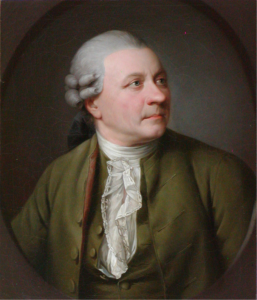The early graves
(Poet's title: Die frühen Gräber)
Set by Schubert:
D 290
[September 14, 1815]
Willkommen, o silberner Mond,
Schöner, stiller Gefährte der Nacht!
Du entfliehst? Eile nicht, bleib, Gedankenfreund!
Sehet, er bleibt, das Gewölk wallte nur hin.
Des Maies Erwachen ist nur
Schöner noch wie die Sommernacht,
Wenn ihm Tau, hell wie Licht, aus der Locke träuft,
Und zu dem Hügel herauf rötlich er kommt.
Ihr Edleren, ach es bewächst
Eure Male schon ernstes Moos!
O wie war glücklich ich, als ich noch mit euch
Sahe sich röten den Tag, schimmern die Nacht.
Welcome, oh silvery moon,
Beautiful, quiet companion of night!
Are you flying off? Do not rush, wait, friend of reflection!
Look, he is staying, it was just the clouds surging past.
Only the awakening of May is
More beautiful than the summer night,
When dew trickles from his curls, bright as light,
And he comes up over the hill, rather red.
Oh, you more noble ones, growing over
Your monument already there is solemn moss!
Oh, how happy I was when I was still with you
Watching the day dawn and the night gleam.
All translations into English that appear on this website, unless otherwise stated, are by Malcolm Wren. You are free to use them on condition that you acknowledge Malcolm Wren as the translator and schubertsong.uk as the source. Unless otherwise stated, the comments and essays that appear after the texts and translations are by Malcolm Wren and are © Copyright.
☙
Themes and images in this text:
Clouds Dew Graves and burials Hair Hills and mountains Light May Morning and morning songs Moss Night and the moon Red and purple Silver Summer
The images come thick and fast, and on a first reading or hearing we are not at all sure about the connections between the thoughts. The moon has no sooner arrived than it seems to be flying off. If only May’s awakening can be more beautiful than the arrival of the moon, how can it be ‘like the summer night’? (Klopstock’s famous experiment with avoiding rhyme adds to this sense of uncertainty). It is only when we reach the final line that we begin to notice the overall structure of the text: the writer is evoking a lost happiness when watching the day dawn (stanza 2) and the night shimmer (stanza 1).
Stanza 1 is monochrome: the silver moon glows and is then occluded by darker clouds. It is ‘silent’. Even the surging clouds do not disturb the calm effect. Stanza 2, on the other hand, is more vivid and active. The scene is ‘as bright as light’ (only an incompetent or a major poet would attempt such a tautology) and day emerges above the hills ‘rather red’ or ‘reddish’ (which seems to be more dynamic than simply ‘Morgenrot’, dawn, literally ‘morning red’). The dew of early morning is actually ‘trickling’ off the plants (May’s ‘curly locks’).
Both types of beauty (active, bright day and contemplative, silvery night) are now lost to the speaker. As so often in later stages of grief, the reality of bereavement hits us as a shock, triggered by an unconscious memory or association. The speaker suddenly finds that his focus is not the moonlight, where he thought it was, but the memory of other nights in the company of those who are now dead.
We are now in a position to follow the speaker’s stream of consciousness (but in banal prose rather than the much more evocative poetry that has captured the experience more faithfully): “Oh, the moonlight is nice – Oh, no, it’s gone – Oh, that’s a relief, it’s back again (it was just passing clouds) – There is nothing more beautiful than a moonlit night – Yes, there IS, the start of May and summer – Early mornings with things covered in dew and the red of dawn starting to appear above the hill – OH NO, I thought I had forgotten but I haven’t and I can’t – They have been dead so long now (there is even moss growing on the graves), but I am still bereft – I will never be as happy again as I was when I was with you watching the day dawn in May and the night glimmer in the moonlight.”
☙
Original Spelling Die frühen Gräber Willkommen, o silberner Mond, Schöner, stiller Gefährte der Nacht! Du entfliehst? Eile nicht, bleib, Gedankenfreund! Sehet, er bleibt, das Gewölk wallte nur hin. Des Mayes Erwachen ist nur Schöner noch wie die Sommernacht, Wenn ihm Thau, hell wie Licht, aus der Locke träuft, Und zu dem Hügel herauf röthlich er kommt. Ihr Edleren, ach es bewächst Eure Maale schon ernstes Moos! O, wie war glücklich ich, als ich noch mit euch Sahe sich röthen den Tag, schimmern die Nacht.
Confirmed by Peter Rastl with Klopstocks Oden. Erster Band. Leipzig bey Georg Joachim Göschen. 1798, page 223; and with Oden von Klopstock. WIEN, gedruckt bey Joh. Thomas Edlen von Trattnern, k.k. Hofdruckern und Buchhändlern. 1784, pages 207-208.
To see an early edition of the text, go to page 223 [241 von 356] here: http://digital.onb.ac.at/OnbViewer/viewer.faces?doc=ABO_%2BZ223304809


